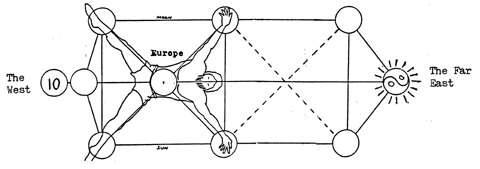The ethnic names below come from ancient and mediaeval sources dating from the late 1st millennium BC to the early 2nd millennium AD. They do not necessarily represent contemporaneous, distinct or Germanic-speaking populations or have common ancestral populations. Some closely fit the concept of a tribe. Others are confederations or even unions of tribes. Some may not have spoken Germanic at all, but were bundled by the sources with the Germanic speakers.
Some were undoubtedly of mixed culture. They may have assimilated to Germanic or to other cultures from Germanic. Long-lasting ethnic identities changed population base and language over the centuries. As for genetic characteristics, they must be considered unrelated to these names.
Apart from these limitations, it is probably safe to assume that, on the whole, most of these populations spoke some branch of Germanic and contributed to pools of descendants who currently live in the Germanic-speaking countries. Many of the names descend to modern place names.
Ancient and Medieval
A
Adogit, Adrabaecampi, Aelvaeones, Aeragnaricii, Ahelmil, Alamanni or Alemanni, Ambrones, Ampsivarii or Ampsivari, Angles, Anglo-Saxons, Angrivarii or Angrivari, Arochi, Augandzi, Avarpi, Aviones
B
Baemi, Banochaemae, Batavii or Batavi today known by Batavians, Batini, Bavarii, Bergio, Brisgavi, Brondings, Bructeri, Burgundiones, BuriByzantines
C
Calucones, Canninefates, Casuari, Caritni, Chaedini, Chaemae, Chaetuori, Chali, Chamavi, Charudes, Chasuarii, Chattuarii, Chauci, Cherusci, Chatti, Cimbri, Cobandi, Condrusi, Corconti, Curiones
D
Danduti, Dani, Dauciones, Diduni, Dulgubnii, Dutch, Danes
E
Eburones, English, Eudoses, Eunixi, Evagre,
F
Faroese, Favonae, Fervir, Finni, Firaesi, Flemish, Forsi, Franks, Frisians, Fundusi
G
Gall-Gaidheal, Gambrivii, Gauthigoth, Geats, Gepidae, Goths, Gutar Grannii
H
Hallin, Harii, Harudes, Hasdingi, Helisii, Helveconae, Heruli, Hermunduri, Hilleviones, Horder
I
Ingriones, Ingvaeones (North Sea Germans), Intuergi, Irminones (Elbe Germans), Istvaeones (Rhine-Weser Germans) Icelanders
J
Jutes, Juthungi
L
Lacringi, Landi, Lemovii, Levoni, Lombards or Langobardes, Liothida, Lugii
M
Manimi, Marcomanni, Marsi, Marsigni, Marvingi, Mattiaci, Mixi, Mugilones
N
Naharvali, Narisci or Naristi, Nemetes, Nertereanes, Nervii, Njars, Norn,Nuitones,Norwegians
O
Ostrogoths, Otingis
P
Parmaecampi, Pharodini
Q
Quadi
R
Racatae, Racatriae, Ranii, Raumarici, Reudigni, Rugii, Ruticli
S
Sabalingi, Saxons, Scirii, Segni, Semnoni or Semnones, Sibini, Sidini, Sigulones, Silingi, Sitones, Suarini or Suardones, Suebi or Suevi, Suetidi, Suiones, Sugambri, Swedes
T
Taetel, Tencteri, Teuriochaemae, Teutonoari, Teutons, Theustes, Thuringii, Toxandri, Treveri, Triboci, Tubantes, Tungri, Turcilingi, Turoni
U
Ubii, Ulmerugi, Usipetes, Usipi or Usippi
V
Vagoth, Vandals, Vangiones, Vargiones, Varini, Varisci, Vinoviloth, Viruni, Visburgi, Visigoths, Vispi
Z
Zumi
Alphabetic list
Some tribal maps of Germania can be found at:
These maps or any other maps represent an interpretation of the information available to the map-maker. Typically the ancients did not know or did not leave enough information for us to locate them exactly. The maps only give us a rough idea of the features and ethnic locations of Germania. In addition, some of tribes, e.g. the Bastarnae are not identified as Germanic with any certainty and large areas in Central Europe the Germanic tribes probably only constituted a newly arrived minority among Slavs and remaining Celts. Wolfram (1990:91f), for instance, points out that the early Visigoths, called Tervingi also comprised many Taifalans (unknown origin) and Alans (Iranians). The Alans became so Gothicized that non-Germanic people considered them to be Goths.
Germania of Tacitus
A speculative Findlay map of 1849
 Contemporary
ContemporaryNorth Germanic
- Danes
- Slesvigers
Dano-Germans/German-Danes (may be included as an Ethnic German, or Ethnic Danish group)
- Holsteiners
Schleswigers
Hutterites (North American Diaspora)
Liechtensteiners
Luxemburgers
Mennonites (North American or Eurasian Diaspora)
Styrians
Swabians
Swiss German majority of Switzerland
Walser German and Walliser German minorities of Aosta Valley
South Tiroleans
Lorrainians
- Holsteiners
- Slesvigers
No comments:
Post a Comment